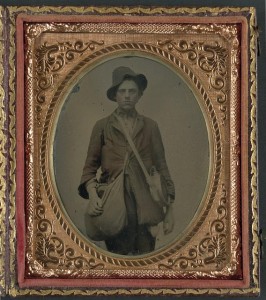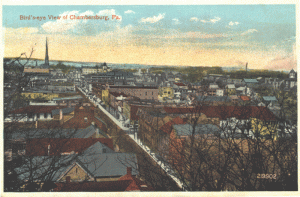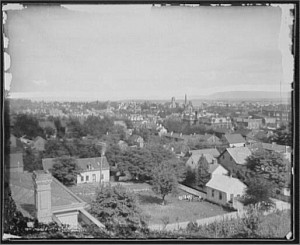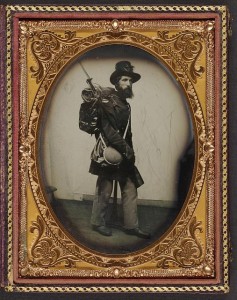These Guys Are throwing Food Away?
The 19th New York Volunteer Infantry has been ordered to move from Washington, D.C. to the Shenandoah Valley to reinforce Union General Robert Patterson. On July 6, 1861 they loaded into freight cars and headed north out of Baltimore.
The train made its shrieking entry to Harrisburg early Sunday, July 7th.
Here began a series of kind attentions which the inhabitants of every stopping place lavished upon the far from coy volunteers. These generally took the form of presentations of first class food. No delicacies were too good to be lavished on the brave but insatiate defenders of our country. It is to be feared that the 19th left behind it a trail of empty larders in Pennsylvania. At Chambersburg, a church meeting dissolved for no other purpose than to bring a meat offering to the volunteers. Travel gave the Cayuga boys a wonderful appetite for luxurious fare. They took all that come. Salt pork and hard tack were shied at passing telegraph poles, and distended haversacks and tight belts told the tale of Pennsylvania hospitality. A stock of turkey, ham and cake was laid in for future emergencies.
At 5 1-2 P. M., the train halted at the terminus of the railroad in the village of Hagerstown. The companies debarked. Gen. Patterson’s Quarter-master here supplied Col. Clark with wagons for the transportation of camp equipage and officers baggage. While five men from each company were loading up, the regiment stretched its limbs in the village, where fresh attentions from the citizens made it happy and put strength into it for the march now before it.
Col. Clark ascertained here that Gen. Patterson had crossed the Potomac at Williamsport and advanced to Martinsburg in the Shenandoah Valley, sixteen miles from Winchester. All reinforcements he had left orders for, to follow him thither. Before departing en route to the front. Col. Clark received instructions to bring on to the army under the protection of his regiment, Doubleday’s thirty pound rifled cannon before spoken of. As it had not come, up to eight o’clock, the Colonel ordered Capt Kennedy to remain with Company B, until it did come and bring it on. The regiment was then assembled and put under way to reach Williamsport, six miles distant, that night.
A soldier on the march is a curious looking object. Baggage dangles from every part of his person. Knapsack and haversack, blanket, cup and canteen, added to the regular equipment of musket, belts, bayonet scabbard, and cap and cartridge boxes, give him a singular appearance. The weight of this paraphernalia is considerable, seldom less than 40 lbs., and as much more, ranging as high as 70 or 80, as the soldier chooses to make it. Green soldiers invariably carry all they can stagger under and such was the case with the 19th on this occasion. A thousand unnecessary knick-knacks and a heavy surplus of provisions incautiously laid in, fairly burdened the men down, and to such an extent, that when, after a hot and dusty march, they reached Williamsport at 10 1-2 o’clock, they were thoroughly fagged out. They learnt discretion very rapidly after that experience.
Reaching a pleasant hill, back of the village, a halt was ordered for the night. The 28th N. Y. lay there in a large meadow, by the side of the road. The 19th went into bivouac on a grassy campus opposite them. Filing into the field, the order, habitually given when preparing to camp, was uttered: “By companies; by the right flank; to the rear, into column; march.” The head of each company broke off, that is turned square to the right, and marched off a few rods at right angles, then, halting, faced to the front, forming the regiment into column by companies. The weary men stacked arms and dropped to the ground and slept soundly in their places pillowed on their knapsacks and blankets, while a guard kept watch over the bivouac. (From Cayuga in the Field by Henry Hall and James Hall)

Maybe quartermaster has more of his stuff (Unidentified in Confederate uniform LOC - LC-DIG-ppmsca-31464)
Well, the North and South had at least one thing in common early in the war – soldiers on both sides carried too much stuff. From History of Kershaw’s Brigade by D. Augustus Dickert:
The baggage of the common soldier at this stage of the war would have thrown an ordinary quartermaster of latter day service into an epileptic fit, it was so ponderous in size and enormous in quantities–a perfect household outfit.
Citizens in Pennsylvania and parts of Maryland sure are generous providing good food for the troops.



